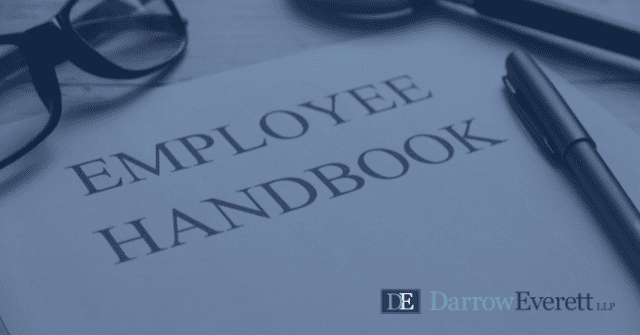Posts Tagged ‘Andrew J. Adams’
Noncompete, Overtime Rules Change, But Legal Challenges Remain
April 23, 2024, was a big day for the Biden Administration, as the U.S. Department of Labor (“DOL”) and Federal Trade Commission (“FTC”) almost simultaneously launched new revamped rules which will affect millions of employers and employees nationwide. There are important items and deadlines for both rules which employers will have to comply with absent…
Read MoreAmid Shifting Policies, Employee Handbooks Can’t Be Static Manuals
As we’ve said before, one of the easiest and least expensive tools for businesses to reduce liability and insulate from (at least some) risk, is often the one most frequently overlooked. Creating, promulgating, and most importantly enforcing an employee handbook is a simple and efficient way to communicate company policy and expectations to your employees…
Read MoreHow 2024 Employment Law Updates Affect Your Wallet, Unions & More
As could be expected in 2023, employers have had to adapt to an ever-changing landscape of employment laws, regulations, and in the case of the National Labor Relations Board (NLRB) a growing library of general counsel memoranda. Here’s a snapshot of several important employment law developments that employers should understand heading into the new year.…
Read MoreQ3 Employment Law Updates: Enforcement Actions Bring Much for Employers to Consider
The third quarter of 2023 has been pretty exciting as far as employment lawyers are concerned. Substantial regulations have been proposed and the pressure from federal agencies continues to rise. We will talk about some of the most influential changes over the last three months which will be of interest to all employers. NLRB Comes…
Read MoreQ2 Employment Law Updates: Non-Competes, Religious Accommodation and More
So far, 2023 has been a wild ride for employers, a theme that looks to be continuing into the third quarter of the year. While certain predictions we made during Q1 came true in Q2 (we are looking at you, NLRB), others such as the Supreme Court’s decision in Groff v. DeJoy[1] took us by…
Read MoreThe Show Must Go On: Entertainer-Employee Classification Takes Center Stage for Venues
It’s spring 2023, live entertainment is back, and perhaps so is the Internal Revenue Service (“IRS”). The Inflation Reduction Act, signed into law on August 16, 2022, authorizes $80 billion in funding for the IRS over the next 10 years, of which more than $45 billion is earmarked for enforcement. [1] What does this mean…
Read More2023 Employment Law Updates: Q1 Developments from Pregnancy to Polyamory
As we discussed in our annual update back in December, employers continue to see extensive developments on the labor and employment front as they progress through 2023. Aside from the minimum wage increases, pay equity/transparency, cannabis, and other updates which you can read about in our previous DE Insight, there are several new developments that…
Read MoreGoing by the Handbook Can Be Employer’s Best Defense
Businesses are always searching for new ways to reduce liability and insulate themselves from risk, but one of the easiest and least expensive tools is often the one most frequently overlooked. Creating, promulgating, and most importantly enforcing an employee handbook is a simple and efficient way to communicate company policy and expectations to your employees…
Read MoreThe Hunger Games: Can Competition Be Stopped?
On Jan. 5, the United States Federal Trade Commission (the “FTC”) proposed a new rule which acts as a complete ban—both prospectively and retroactively—on all non-competition agreements (“non-compete(s)”) (the “Proposed Rule”), impacting restrictive covenants as a whole, with an impact extending to both confidentiality and non-solicitation provisions. While those in support of the FTC’s Proposed…
Read MoreEverything and the Kitchen Sink: The NLRB’s Labor-Friendly New Year’s Resolutions
Contrary to the expression’s limitations, the National Labor Relations Board (“the Board”) set the tone for 2023 with some major decisions that will essentially provide employees with not only the kitchen sink, but the walls and the foundation too. The Board fundamentally altered the landscape when it comes to collective bargaining, property interests, damages in…
Read More










